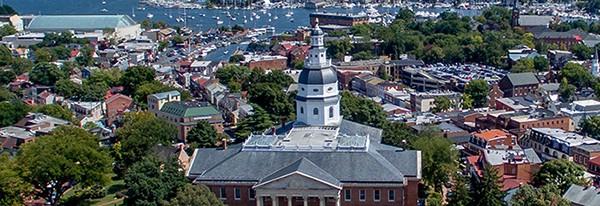Date:
Source: Capital Gazette, Danielle Ohl
As nearly 200 residents gathered to discuss the future of City Dock, Mayor Gavin Buckley announced a speaker series, kicked off by a talk from former Charleston, South Carolina, Mayor Joe Riley.
Riley, one of the longest-serving living mayors in the United States, over 10 terms transformed Charleston and addressed some of the same issues facing downtown Annapolis. He will speak May 20 at 7 p.m.
Charleston can serve as a case study, said chief of staff Susy Smith. Riley will discuss how to revive underperforming city center using community ideas.
Community ideas were the theme of the night, the first large-scale community meeting to discuss City Dock revitalization since the City Dock Action Committee began work.
The committee visited with the Ward One Resident Association, said committee chair Eileen Fogarty, but the Monday meeting at Pip Moyer Recreation Center was the first time the public could submit feedback on various issues affecting the City Dock area.
Residents and community leaders turned out in droves and packed small round tables to discuss parking, culture, maritime access and more.
The City Dock Action Committee is tasked with taking the findings of the Urban Land Institute’s recent study of City Dock and creating short and long-term action the city can take.
It also includes nine subcommittees on various downtown issues, including design, financing, community programming and maritime access, made up of more than 75 volunteers.
The institute study is the latest of eight studies of the area completed since 1987. But with the support of Historic Annapolis, the latest report has gained steam and the endorsement of the mayor.
The report, a result of two days of interviews with residents, lawmakers and business owners, suggests Annapolis should preserve the existing “envelope” of buildings near City Dock, but move forward with development that would honor the city’s working-class maritime history and attract visitors to the waterfront.
The Urban Land Institute report recommends relocating the harbormaster’s office to the Burtis House, while expanding the structure to include a museum.
Residents advocated for more green space, relocated parking with smarter signage and easily accessible shuttles, water access and cultural inclusion, among other things.
“We should bring the Chesapeake Bay to that corner,” said Michele Cordle in discussion with her “Placemaking” group. Cordle noted her kids like to go crabbing and the waterfront area could be improved by an oyster shack or other connections to the bay.
Others suggested greater access to the water from the land — be it via transient docks for stand-up paddle boards and kayaks or floodable steps leading from the sidewalk down into Ego Alley.
“Parking/Biking” groups suggested intelligent signage directing drivers in real time to available parking. They pointed to institutions with large parking lots, such as Maryland Hall, schools and the Navy-Marine Corps Memorial Stadium, which could partner with the city to offer off-hour parking with shuttle services.
“Soul of the City” groups grappled with how to make City Dock more inviting to people of all backgrounds, but also how to make the waterfront attractive year round.
Environmental groups advocated for flooding solutions and responsible land use. Family Activity/Events and Recreation groups suggested sports like pickleball and table-tennis, group fitness classes and concerts.
The city and nonprofit Historic Annapolis created the action committee to study the findings and expand on the recommendations with specific action items.
Fogarty, a former city planning and zoning director, leads the group and identified some of the problems plaguing the Annapolis waterfront — dilapidated alleyways and sidewalks, lack of green space.
The action committee will compile final recommendations by October with an end goal of creating a more accessible, enticing City Dock. The full committee will meet at least four more times before October.
The smaller working committees will report out in two tiers, Fogarty said, with general recommendations coming at the end of the month and findings combining resiliency and financing will come at the end of June.


